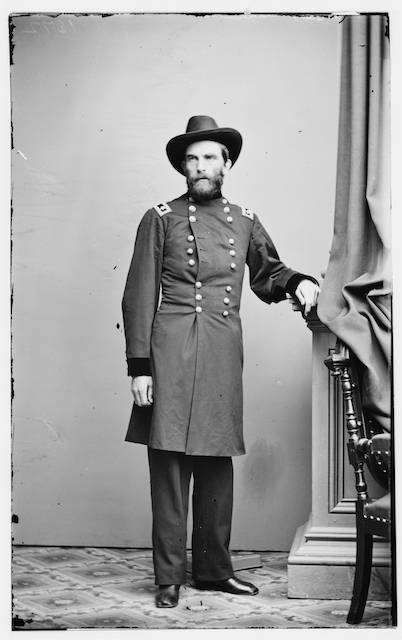
Grenville Dodge, an officer of the Federal Army during the American Civil War, won a promotion to major general for his ability to anticipate enemy actions and in rebuilding damaged railroads. Photo retrieved from the Library of Congress, https://www.loc.gov/item/2018666413/
May/June 2023 (Volume 15, Issue 3)
By Timothy Walch
Although he did not look the part, Grenville Mellen Dodge was a man of intrigue. To be sure, Dodge rose to fame and fortune as a driving force behind the Union Pacific Railroad. But appearances can be deceiving. There was much more to Grenville Dodge than railroads. He was, at his core, a man of strategies and secrets.
Dodge had several careers over the course of a long life. He was an explorer, an entrepreneur, a promoter, a politician, a builder, a financier and a military strategist. Among his greatest admirers was Theodore Roosevelt who noted that Dodge was “typical of what we like to regard as essentially American.”
There also was a dark side to Dodge that should be acknowledged. He was autocratic and obstinate. He was prone to greed and questionable business ethics. And, sadly, he was demonstrably racist in his campaigns against American Indians on the Great Plains. He was, in sum, a complex man.
That complexity was manifest in Dodge’s role in the evolution of military intelligence — the fine art of espionage. He used cryptic manners and methods to anticipate enemy tactics and his knowledge and advice became a critical component in multiple engagements. He was the “magician” who made the difference.
There is little in his early years that would indicate that Dodge was destined for a life of intrigue. He was born in Danvers, Mass., on April 12, 1831, the son of Sylvanus and Julia Dodge. His father was a restless man who moved the family frequently in his search for financial stability.
What provided young Grenville Dodge with a focus and a future was the tutelage of a local farmer and engineer named Frederick Lander. It was Lander who recognized that the boy was intelligent and allowed him to assist in surveying a new railroad spur. With Lander’s encouragement and assistance, he entered Norwich University to study engineering. Barely into his teens, Dodge had found a passion that would change his life.
Following his graduation in 1850, the young engineer moved west for a life of adventure. Intelligent and ambitious, Dodge soon partnered with Peter Dey in planning the Mississippi and Missouri Railroad, the predecessor of the Chicago, Rock Island and Pacific Railroad. In this work, Dodge and Dey laid out the rail line from Davenport to Council Bluffs.
Dodge was enthusiastic about railroads in general and Council Bluffs in particular. In this regard, he had a chance meeting with Abraham Lincoln in 1859 that lasted more than two hours. Dodge’s passion made a deep impression on the Illinois lawyer and convinced him that Council Bluffs should be the eastern terminus of the impending Union Pacific Railroad. In 1863, then President Lincoln would confirm the good sense of Dodge’s proposal.
Some considered it surprising that a 28-year-old railroad engineer would make such an impression on Lincoln. Dodge was hardly charismatic and exhibited little command presence. He often appeared unkempt and showed only passing attention to his dress. Of greater concern was his overall physical condition and a number of his colleagues referred to him as “a sickly fellow.”
But there was more to this Iowan than those first impressions and Lincoln could see through the façade. Always a shrewd judge of talent, Lincoln had a sense that there was more to Dodge than met the eye. Lincoln came to believe that Dodge was a man with “good deal of executive force, a man that, when he went into anything, went in with his whole soul.”
It was this quality that became manifest during Dodge’s service in the Union Army during the American Civil War, in which he would create an intelligence gathering network that was a precursor to the modern Intelligence Corps of the U.S. Army. In fact, Dodge rose in rank and influence month by month during those critical years from 1861 until he had established a partnership with Ulysses S. Grant himself. Their band of brotherhood lasted through the war and for many years thereafter.
TO READ THE ENTIRE STORY AND OTHER FASCINATING STORIES ABOUT IOWA HISTORY, subscribe to Iowa History Journal.
